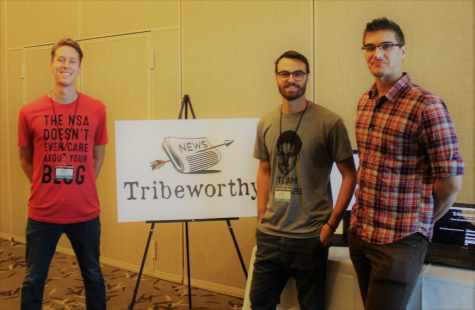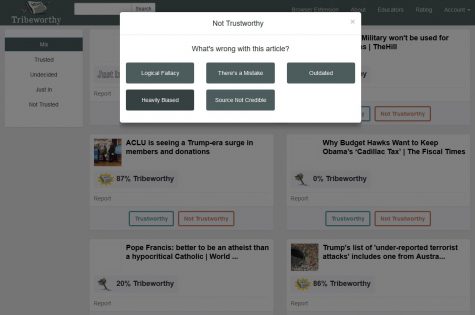Americans are becoming increasingly skeptical of their news sources.
In a report conducted by the Pew Research Center released in December, 32 percent of U.S. adults said they often see fake political news online, and 51 percent of adults say they often see inaccurate political news reports.
Three Chico State alumnus seek to change that by providing a platform that lets readers critique the news themselves. Tribeworthy.com is that platform, and lead developer of Tribeworthy Austin Walker says their rating system guides users through a critical thinking process, which opens the users minds to biases, logical fallacies, and misrepresentations within an article.

“I would say that we like to call ourselves the Yelp or Rotten Tomatoes of online articles, but rather than an up or down vote, or five-star-review, we’re asking you to think more critically,” said Chase Palmieri, CEO of Tribeworthy.
Brand Manager Jared Fesler said their team’s diversity helped them to remove their own biases in the process of creating the website. That’s why the Tribeworthy team has created a system they think will defer attempts to intentionally bring an article’s rating down, he said.
“First off, the review process is not a simple up or down vote. You have to actually critically review the article in a way that identifies the root problem,” Palmieri said.
“We also center the top three most reviewed problems of the lifetime URL of an article, so trolls that are acting as individuals will not be able to gain the system, and another thing we’re doing is associating a trust rating to individual users overtime which will add to the weight of their reviews.”
Fesler said the website launched three weeks ago and the general idea was one year and two months in the making. There’s still a lot of work to add functionality. An iOS browser extension is currently being developed so that users can upload articles away from the website.
Even in the site’s raw form, the system is straightforward and easy to use. The homepage displays articles that are trending, along with their trust rating. In order to review an article the user must create an account, but the process is quick and simple. Once the account is created the user can rate an article simply by pasting the URL.
If the user deems the article “not trustworthy” a window pops up displaying five different selections: logical fallacy, heavily biased, there’s a mistake, source not credible, and outdated. Each selection has sub-selections, for example, when clicking logical fallacy a list of logical fallacies appear. If unsure about what some of the terms mean, there are hover menus which provide explanation.
Michael Fritz can be reached at artseditor@theorion.com or @theorion_arts on Twitter.






Nah nah // Oct 28, 2017 at 10:52 am
Hey Orion, nice that you agree with what Triveworthy does. However, how willing will YOU be to get tested? Because some of your articles I’ve glanced over are FILLED with biases and fallacies.
Lars Anderson // Feb 28, 2017 at 8:46 am
Nice story to read, great to see ex-Chico Students coming up with terrific concept like this, there is a real need for this service they are offering.
Tribeworthy // Feb 27, 2017 at 9:42 am
Thank you for writing this piece on Tribeworthy, Michael!
When distrust is at an all time high, journalists should use feedback from news consumers regarding why they trust certain article over others. That’s why we created Crowd Contested Media: the practice of a large number of people challenging online content by identifying bias, illogical arguments, mistakes, and other flaws.
If you’d like to be come a leader in this movement, contact jared@tribeworthy.com